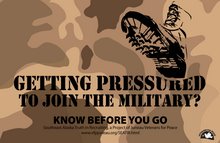 Written by John Malkin
Written by John MalkinGood Times Weekly
Wednesday, 16 January 2008
UC Santa Cruz grad Robert Zabala on the war, his conscience and why he just had to get out of the military
It may sound simplistic, but I have often thought that there would be fewer wars if people with guns stopped shooting them. Throughout U.S. history, hundreds of soldiers have connected with their conscience and objected to military service. But history lessons have tended to cast a heroic light on generals and their battles while leaving acts of conscientious objection to war on the cutting room floor.
Robert Zabala enlisted in the U.S. Marines in 2002 but his experiences in boot camp brought up ethical questions and led to a deeper reflection on the interconnectedness of life. He filed a conscientious objector application in 2004 and on March 29, 2007, U.S. District Court Judge James Ware ruled that Zabala was to be granted an honorable discharge and be released from the Marines within 15 days. Zabala, a graduate of the University of California in Santa Cruz, is now 23 years old and a resident of San Jose. Here, he reveals his journey beyond the military.
When you joined the Marines, what was your motivation?
I was 17 years old and I really wanted to show the world that I was made of something tough, raw and real. Also, I come from a huge long line of people who served in the military. My grandfather served in Vietnam. My grandmother taught officers how to speak Tagalog in Monterey. My mother and father both were in the Navy in the Gulf War.
Probably the biggest reason that I wanted to join the Marine Corps was that growing up a child so dependent on the welfare state, I felt that I should pay back this debt to society. I grew up on food stamps and free meals you get in public schools - even my college was paid for by financial aid.
What was that recruitment experience like?
I was the easiest sucker they’ve ever recruited! I walked right into that recruiting station and they told me all the things that I wanted to hear. They said, “You’re a smart guy, and a lot of the leadership skills that you’re going to learn in the Marine Corps, you’re going to be able to translate into the real world and you’ll be a better person.” Man, did I fall for it.
Could you choose what you would be doing in the Marines?
The recruiters say, “Hey, you can do this kind of job – you’ll work strictly with radars.” That’s what I was supposed to be, a wireman. When I got to boot camp it turns out that my recruiter didn’t do that at all. I was going to be a rifleman. And after I graduated from boot camp, when I joined up with my reserve unit in San Bruno, I met up with my first sergeant and he looked me over once and said, “Hey, guess what? You’re going to be a machine gunner now.” It’s that funny little clause in the contract that you sign that says at anytime they can change what you’re doing or where you’re stationed. Read article
